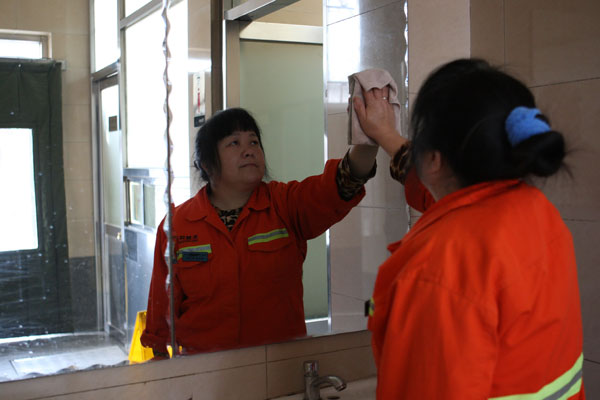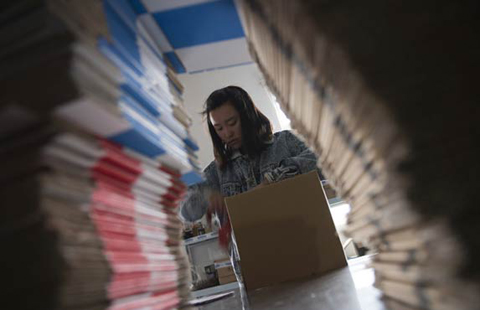Proud to be a toilet cleaner
Updated: 2015-02-27 07:17
By Zhang Xuan(China Daily)
|
||||||||
 |
|
Zhang Minghua and her husband, Zhao Xiandong, work as toilet cleaners outside Lama Temple in Beijing.[Photo by Wang Zhuangfei/China Daily] |
Zhang Minghua's typical day begins before the sun rises and ends around 11 pm. Zhang Xuan gets a glimpse of her life outside Lama Temple in Beijing.
A day in the life of Zhang Minghua, a 46-year-old public toilet cleaner outside the revered Lama Temple (Yonghegong) in downtown Beijing, begins early. She reports to work at around 5 am and cuts a lonely figure while putting on her uniform to begin cleaning the women's toilet before daylight breaks. The temple stays open from 9 am to 4 pm daily.
Her job usually ends by 11 pm, even during the bitter winter. Zhang wakes up without an alarm.
She has worked at the temple for the past two years. In 2008, she came to Beijing from a poor village outside Guangyuan city in Southwest China's Sichuan province. Since then and until 2012, she worked as a toilet cleaner at Longfu Building, a commercial complex near the Dongsi subway station.
Here's how the rest of her day goes:
7 am: A small dose of sunshine enters her living quarters, which is basically a 7-square-meter room adjoining the men's and women's toilets at the temple. The room that she and her husband, Zhao Xiandong, 49, share has a 1.8-meter-long sofa bed, an electric heater and some kitchenware.
Zhao cleans the men's toilet, and he steps back into their room after checking up on his section. They then exchange notes over a quick breakfast of porridge.
"My toilet is clean. I suppose almost no one came here last night," Zhao tells his wife.
Although the temple stays open until 4 pm, people can use the toilets even late at night because their units are located outside the temple.
But the women's toilet is worse than the men's. Zhang uses disinfectants and pieces of cloth to clean the toilet that has just one stall, with a squatting unit.
A young woman comes in looking distressed and flings open the toilet door with one foot. After she leaves, Zhang cleans the handle of the toilet door with a piece of new cloth and a cleanser until it looks spotless. She then scrubs the shoe print off the door.
"I don't grumble," Zhang says. "Providing a comfortable and clean environment to users is my duty. I am paid to do it."
In the early hours of the day, Zhang probably cleans the handle of the door more than a hundred times. Toilet users, of course, may not notice the hard work she has put in.
11 am: After her four-hour morning shift, Zhang takes a two-hour break. It is her time to relax a little. She and her husband cook a lunch of sauteed shredded pork with cucumber and rice. They talk about the money they have saved for the year and plan to send to their 25-year-old son.
Zhang says that they live a better life in Beijing than in their village and that they haven't visited Sichuan since 2009. By raising more money, their only child, who recently finished a contract with an architectural firm and is currently engaged to a farmer, can build a home in the next two years. They want to furnish the son's house, look after future grandchildren and enjoy family time later in life.
Zhang and Zhao say they don't have many friends. Sometimes they cook together with another couple who clean a toilet some 200 meters away.
1 pm: For Zhang, the arrival of many tourists at the temple in the afternoon makes her work harder. She has to pick up used toilet paper and sanitary tissues from the ground for hours.
"I must stay here for the whole afternoon. Otherwise, this place will be dirty in 20 minutes," she says.
Mornings are easier.
On full-moon days and weekends, when visitors turn up in high numbers, Zhang needs to stay in the toilet for the whole day. Since taking up this job, she has come to understand that patience and persistence are important.
3 pm: A middle-aged woman spits on the ground. When Zhang tells her politely that she could spit into the squatting pot the next time, the woman shouts at her: "Who do you think you are? Your responsibility is to clean this."
Zhang lowers her head and replies in a low voice: "Sorry, I will clean it."
After that woman leaves, Zhang says she feels really sorry for such behavior. Many Chinese look down on toilet cleaning as a job and tend to mistreat cleaners.
"When we have difficulties, I'm here to comfort my wife," Zhao says.
4 pm: When Zhang is cleaning a squatting unit, she hears someone say: "Thank you" in Chinese.
The speaker is 20-year-old American tourist Chelsea Hawkins. She tells Zhang she is very grateful for her because she keeps the toilet clean and tidy. Zhang is surprised and smiles.
Zhang says that her work is acceptable and she is "very proud of it".
"I could do more for visitors, for Beijing," Zhang says.
5 pm: She has already worked for 12 hours now, and she's tired but happy, she says. After a simple dinner of scrambled eggs with tomatoes, she takes a walk around the area. Since she has been put in charge of the toilet, she has never strayed more than 1,000 meters from it.
"I may be needed in the toilet anytime. Hopefully, I will have an opportunity to visit the temple sometime," Zhang says softly.
10 pm: After the last toilet-user has left, Zhang boils some water and takes a shower in the toilet. She will repeat the same cleaning routine day after day. Because she will have an important guest in her house the next day, she decides to spend 10 yuan in a public bathhouse in a nearby hutong (alley) that evening.
"My daughter-in-law is coming to Beijing," Zhang says in delight.
Contact the writer at features@chinadaily.com.cn

 Across America over the week (from Feb 20 to 26)
Across America over the week (from Feb 20 to 26)
 Phoenix landing
Phoenix landing
 Inside a Taobao village
Inside a Taobao village
 Testing mettle: Students appear for art college exam
Testing mettle: Students appear for art college exam
 Top 10 best-selling SUVs in Chinese mainland in 2014
Top 10 best-selling SUVs in Chinese mainland in 2014
 The eighth nine days: wild geese are flying back
The eighth nine days: wild geese are flying back
 China's biggest Akhal-Teke horse base
China's biggest Akhal-Teke horse base
 Chengdu citizens visit Du Fu Thatched Cottage to mark Human Day
Chengdu citizens visit Du Fu Thatched Cottage to mark Human Day
Most Viewed
Editor's Picks

|

|

|

|

|

|
Today's Top News
Tech firms cut from approval list
Yuan on move, but not to top
'Star Trek' legend Leonard Nimoy dies
EB-5 could harbor fraud: report
US Representative requests Lunar New Year honors
Shanghai tops China's disposable income list
Hainan expands US non-stops
Google upbeat about reentering China: Forbes
US Weekly

|

|







